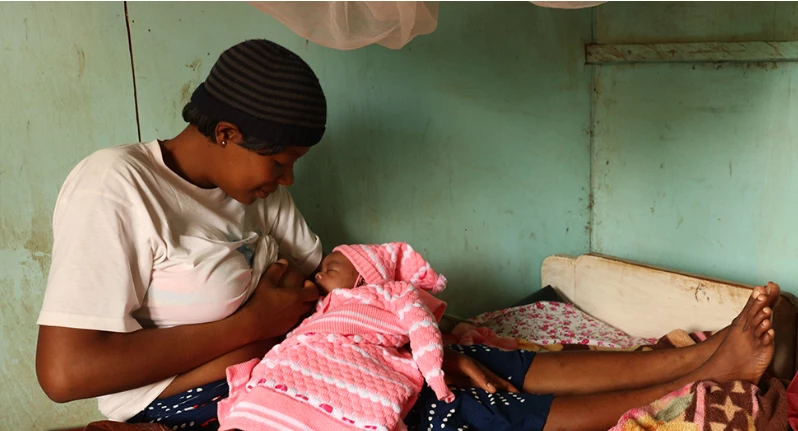
The best first food for a baby, providing essential nutrition in the critical early years of life. A child’s first immunization and her best opportunity for bonding, early stimulation and healthy brain development. Breastfeeding is all these things, but it also more than that -- it is a country’s first step towards building the human capital that will drive their economies in the future.
We know from all available evidence that breastfeeding needs to start immediately after birth, with exclusive breastfeeding for six months -- a child doesn’t need even water until after six months of age. Continued for up to two years, breastfeeding has perhaps the single biggest impact on child mortality compared to any other preventative health measure. Breastfed babies have fewer illnesses and infections, their brains develop better with the right kinds of nutrients, and they have reduced risk of future obesity and tooth decay.
And this adds up to many global benefits. Breastfeeding can help avoid over 800,000 child deaths and 20,000 maternal deaths globally per year, from several causes including breast cancer and other forms of cancers, diabetes and other illnesses. In addition, breastfeeding is also one of the most sustainable elements of the food system, with zero carbon emissions and no food waste.
Our research shows that efforts to promote and protect breastfeeding cost an estimated $0.6 billion per year globally, with potential economic returns of about $30 billion per year over the next ten years. This is a return of about $35 for each $1 invested in breastfeeding promotion and protection. There are very few other best buys in development that can match these returns.
The good news is that globally, breastfeeding rates are slowly increasing and likely to meet and exceed the World Health Assembly (WHA) target of achieving 50 percent exclusively breastfed babies. However, there are huge variations among countries -- some countries have already met or surpassed the target, but 47 countries are off course.
But despite all the evidence about breastfeeding, the world will fail to reap all the benefits without the critical societal and environmental shifts that are needed to protect, promote and support breastfeeding for a mother, her family and all of society. A mother’s choice about whether to breastfeed her baby or not ultimately rests with her. However, in order for breastfeeding to be a viable choice she can make, she and her family need to have a strong enabling environment that provides the right information, policies and support.
At the World Bank, we work closely with national governments to prioritize high-impact interventions that promote and support optimal breastfeeding through our investments in the health sector, as well as through cash transfer programs targeted at poor pregnant mothers and those with young children.
We also invest in counseling and support for mothers and caregivers and support pro-breastfeeding social policies such as implementing the Code on the Marketing of Breastmilk Substitutes and the WHO/UNICEF Ten Steps to Successful Breastfeeding, as well as promoting maternity leave and job protection for mothers.
Countries like Cambodia (65%), India (55%), Peru (69%), Rwanda (87%), Tanzania (59%), and, Uganda (66%) have succeeded in increasing exclusive breastfeeding rates to over 50%. This can be largely attributed to significant investments, policy changes and commitments from domestic governments, as well as support from the World Bank and others.
In Cameroon, the World Bank through IDA support, along with an additional grant from the Global Financing Facility (GFF) is supporting the scaled-up delivery of nutrition services, including the piloting of Kangaroo Mother Care (KMC) to reduce risks related to low birth weight among vulnerable populations. The project focuses on displaced and refugee populations in three Northern districts that are heavily affected by insecurity in the region, and the KMC component involves the promotion of continuous skin-to-skin contact between caregivers and low birth weight infants, with a strong emphasis on exclusive breastfeeding to promote child survival and infant growth and development.
In Rwanda, the World Bank, with grant support from The Power of Nutrition, is working across health and social protection sectors to support pregnant women and women with young infants to provide adequate nutrition for their infants, including breastfeeding. Eligible women in the poorest income groups will receive cash transfers accompanied by communication campaigns to promote breast-feeding and other infant and young child nutrition behaviors to prevent child stunting and build human capital.
As country and individual incomes rise, and as more women get in to the work-force, the pressures not to breastfeed also increase. It is imperative for societies and country governments to invest in national campaigns to support large-scale efforts to keep breastfeeding as a strong social norm, as well as to ensure national legislation to support the Code for Marketing of Breastmilk Substitutes. This would facilitate a successful and sustainable increase in national breastfeeding rates, which are not just about a mother’s ability or desire to breastfeed her baby but equally about ensuring a protective and supportive environment which prevents the undermining of this life- enhancing and highly cost-effective practice.
As we at the World Bank launch the Human Capital Project in Bali in October 2018, we will continue to increase our focus on promoting breastfeeding. We see both the huge intrinsic value of breastfeeding for both mother and child, of course—but we also see it as a crucial part of our efforts to help countries build their human capital by giving the world’s youngest members the best possible start in life.


Join the Conversation